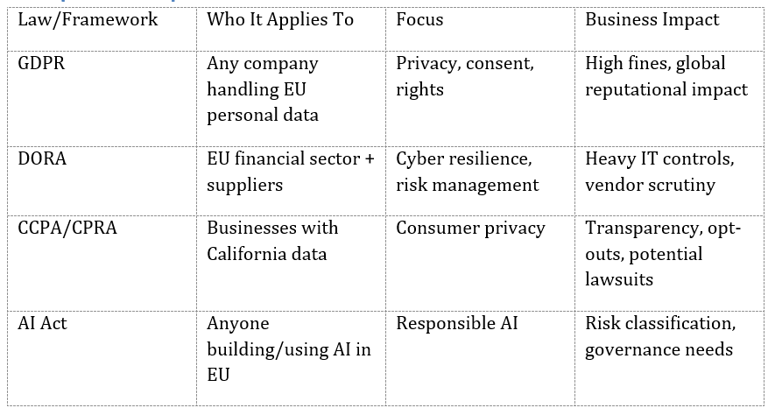GDPR, DORA, and Beyond: The New Privacy Landscape Explained for Business Leaders
GDPRDORACOMPLIANCE AND GOVERNANCEDIGITAL TRANSFORMATION


Introduction: Why It Matters
Data protection is no longer just a legal checkbox. In today’s business world, privacy and resilience are becoming board level concerns. Executives face growing pressure from regulators, customers, and investors to demonstrate responsible handling of data and robust defenses against disruption. In 2023 alone, EU regulators issued over €1.6B in GDPR fines and now, new laws like DORA are adding even more requirements. This guide breaks down the key frameworks and offers practical steps for leaders.
What is GDPR?
The General Data Protection Regulation (GDPR) is the European Union’s landmark privacy law. It sets strict rules on how organizations collect, use, and protect personal data.
Who it applies to: Any company handling data of EU residents, even outside Europe.
Focus: Privacy, consent, individual rights.
Business takeaway: Must handle data responsibly, gain proper consent, and be able to show compliance.
What is DORA?
The Digital Operational Resilience Act (DORA) is a new EU regulation, effective from January 2025. It focuses on making financial services and their technology partners resilient against cyberattacks and IT failures.
Who it applies to: Banks, insurers, fintechs, and their critical IT providers.
Focus: Cyber resilience, risk management, and operational continuity.
Business takeaway: Stronger testing, third-party oversight, and incident reporting are required.
Beyond GDPR and DORA
The regulatory wave doesn’t stop with GDPR and DORA. Other laws are emerging worldwide:
U.S.: State level laws like California’s CCPA/CPRA, with a push for federal privacy rules.
EU: The upcoming AI Act (responsible AI governance) and Data Act (data sharing obligations).
Global: Brazil (LGPD), India (DPDP Act), and others introducing GDPR style laws.
Comparison Snapshot


Key Challenges for Executives
Patchwork compliance: Different rules across regions and industries.
Vendor risk: Third parties can expose you to non compliance.
Board accountability: Regulators expect leadership awareness and oversight.
Speed of change: New rules emerge faster than most compliance programs adapt.
Practical Guidance for Leaders
Know your data: Map where personal and sensitive data resides across systems.
Assess exposure: Identify which laws impact your operations and industry.
Strengthen governance: Assign clear leadership ownership for privacy and resilience.
Demand resilience from partners: Vendor oversight is now a regulatory expectation.
Invest in culture: Training and awareness reduce risks more than tools alone.
Executive Takeaway
The privacy landscape is expanding quickly. GDPR set the stage, DORA raises the bar for resilience, and new laws worldwide are adding complexity. For executives, the message is clear: compliance is no longer just a legal matter. It’s a strategic responsibility. Leaders who embed privacy and resilience into their business strategy will not only reduce risk but also gain trust and a competitive edge.